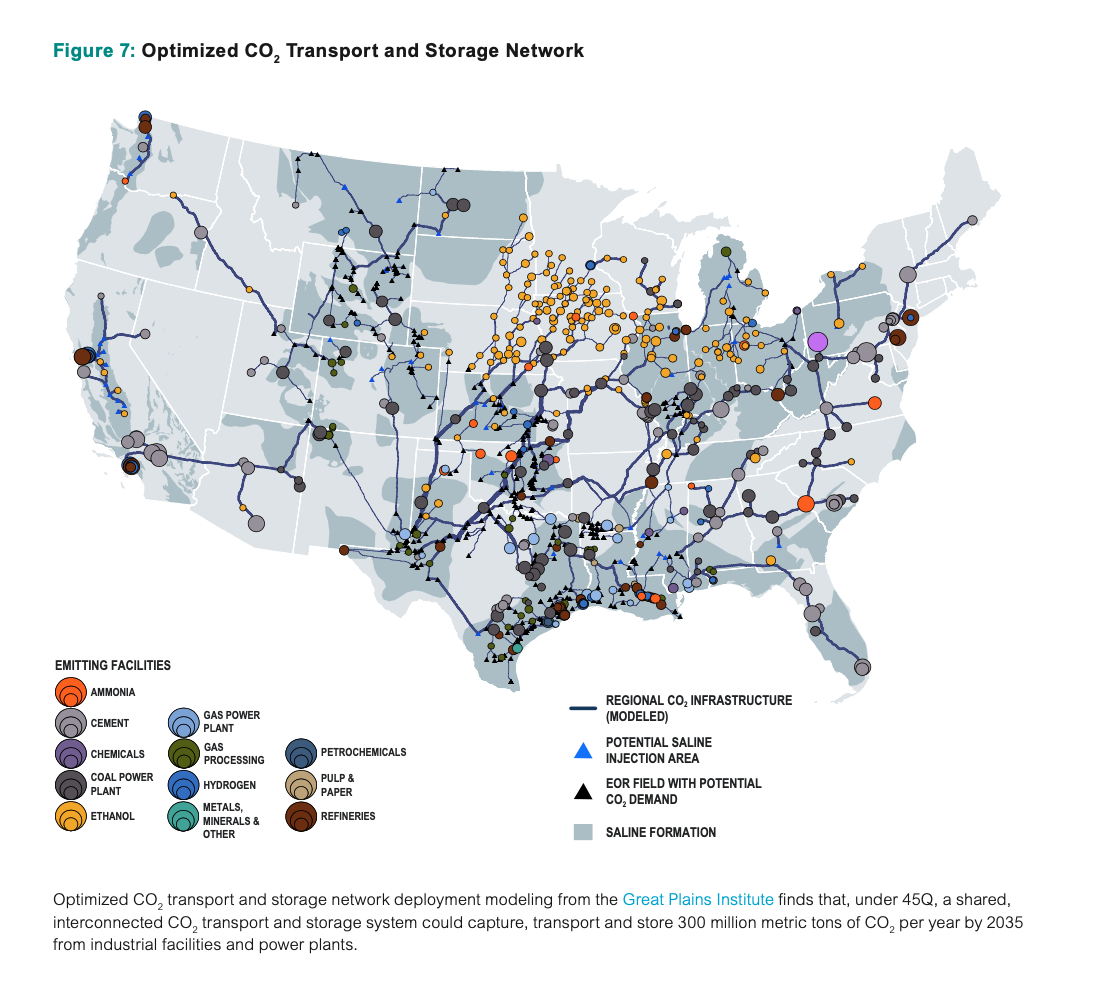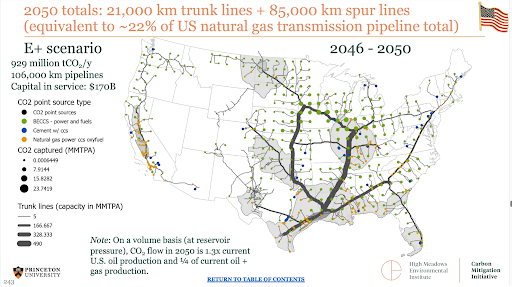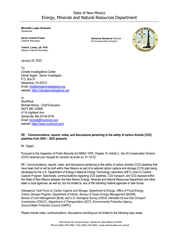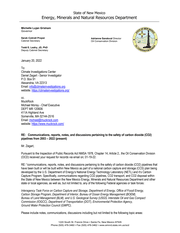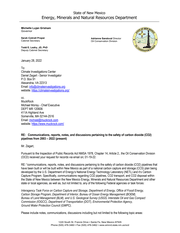New Mexico Energy, Minerals and Natural Resources Department
It is a clone of this request.
| Submitted | Oct. 27, 2021 |
MuckRock users can file, duplicate, track, and share public records requests like this one. Learn more.
Communications
From: Climate Investigations Center
To whom it may concern,
This request focuses on the planning and safety of a nationwide high pressure carbon dioxide pipeline network spanning nearly every state.
We ask this question in light of the recently published HuffPost article “The Gassing Of Satartia” by Dan Zegart, which details an accident in Mississippi where a large CO2 pipeline ruptured in February 2020, flooding a small town with a dense cloud of CO2 and injuring dozens of people, some of whom were found unconscious, trapped in their cars while trying to escape. Most residents were unaware of the danger prior to the incident or how to respond.
The development of carbon capture and storage has been prioritized at the Federal level since the late 2000s. Funding for CO2 pipelines by 2021 is part of multiple bills before Congress.
Maps found within reports published by the U.S. Department of Energy’s National Energy Technology Laboratory (NETL) Carbon Capture Program, Princeton University and non-profit organizations like the Great Plains Institute, show a vast nationwide network of planned CO2 pipelines. Theoretically, the pipeline network would transport captured CO2 from existing pollution sources like power plants, oil and gas production and cement manufacturing, to sites in other states that have been identified for deep injection into geologic formations.
According to maps attached below the request, New Mexico is identified as having existing CO2 pollution sources and/or planned CO2 pipelines and disposal sites. These modeling exercises and maps have been developed for use in national CCS programs, budgeting and planning.
Maps attached are copied from these specific documents:
Carbon Capture Coalition (Great Plains Institute), “Federal Policy Blueprint” February 2021, pg.16
Princeton University, “Net Zero America”, December 2020, page 243
Our FOIA/Public Records request in more detail:
I request copies of all communications, reports, notes, and discussions pertaining to the safety of carbon dioxide (CO2) pipelines that have been built or will be built within New Mexico as part of a national carbon capture and storage (CCS) plan being developed by the U.S. Department of Energy’s National Energy Technology Laboratory (NETL) and it’s Carbon Capture Program.
Specifically, I request all communications regarding CO2 pipelines, CO2 transport, and CO2 disposal within the state of New Mexico between the New Mexico Energy, Minerals and Natural Resources Department and other state or local agencies, as well as, but not limited to, any of the following Federal agencies or task forces:
Interagency Task Force on Carbon Capture and Storage
Department of Energy
Office of Fossil Energy
Carbon Storage Program
Department of Interior
Bureau of Ocean Energy Management (BOEM),
Bureau of Land Management (BLM) and
U.S. Geological Survey (USGS,
Interstate Oil and Gas Compact Commission (IOGCC)
Department of Transportation (DOT)
Environmental Protection Agency
Ground Water Protection Council (GWPC)
I also request copies of any notes, communications, discussions including but not limited to the following topic areas:
CO2 Pipeline Routing and Risks
Any specific CO2 pipeline routes discussed within New Mexico
Consideration of potential risks to communities or environmental justice concerns during route planning process
Pipeline construction specifications - diameter, pressure, capacity of pipelines to be built
Risk of leaks from CO2 pipelines
Experiments or modeling of CO2 pipeline accidents
Potential risk contamination of CO2 waste stream, including hydrogen sulfide and water.
Safety protocols
Setbacks from populated areas - distance
Warning systems for nearby communities
Specialized CO2 training for first responders
Availability of self-contained breathing apparatus for first responders
Information and/or training for health care staff in treatment of hypercapnia (CO2 poisoning)
The time frame for this request is 2003 to the present.
Climate Investigations Center (CIC) requests these records so that communities may have adequate information in order to protect themselves from the hazards posed by CO2 pipelines. The state’s Public Records/Open Records/FOIA law is designed to ensure transparency and for that reason, agencies are to liberally interpret the law in favor of disclosure and to process records in a timely manner.
Disclosure of these records, especially for proposed pipelines, cannot reasonably present a danger to public safety and instead would provide a powerful tool for community input prior to construction. Additionally, to the extent your search results contain information that is legally exempt from disclosure, non-exempt material must be separated from those records to the extent feasible and provided in response to this request.
Because CIC requests this information for the public benefit and has no commercial interest in the material, I also request a waiver of fees. Should you decide to charge fees for providing copies of records in response to my request, please notify me. If practicable, provide copies of records in their native format. I request that you provide records in electronic form using the email address listed below. Please reach out to me with any questions or issues regarding this request.
Thank you for your assistance.
Daniel Zegart
Senior Investigator
Climate Investigations Center
info@climateinvestigations.org
&
Kert Davies
Director
Climate Investigations Center
info@climateinvestigations.org
From: Muckrock Staff
To Whom It May Concern:
I wanted to follow up on the following New Mexico Inspection of Public Records Act request, copied below, and originally submitted on Oct. 27, 2021. Please let me know when I can expect to receive a response.
Thanks for your help, and let me know if further clarification is needed.
From: Muckrock Staff
To Whom It May Concern:
I wanted to follow up on the following New Mexico Inspection of Public Records Act request, copied below, and originally submitted on Oct. 27, 2021. Please let me know when I can expect to receive a response.
Thanks for your help, and let me know if further clarification is needed.
From: Muckrock Staff
To Whom It May Concern:
I wanted to follow up on the following New Mexico Inspection of Public Records Act request, copied below, and originally submitted on Oct. 27, 2021. Please let me know when I can expect to receive a response.
Thanks for your help, and let me know if further clarification is needed.
From: Muckrock Staff
To Whom It May Concern:
I wanted to follow up on the following New Mexico Inspection of Public Records Act request, copied below, and originally submitted on Oct. 27, 2021. Please let me know when I can expect to receive a response.
Thanks for your help, and let me know if further clarification is needed.
From: Muckrock Staff
To Whom It May Concern:
I wanted to follow up on the following New Mexico Inspection of Public Records Act request, copied below, and originally submitted on Oct. 27, 2021. Please let me know when I can expect to receive a response.
Thanks for your help, and let me know if further clarification is needed.
From: Energy, Minerals and Natural Resources Department
Mr. Zegart
Pursuant to the Inspection of Public Records Act NMSA 1978, Chapter 14, Article 2., the Oil Conservation Division (OCD) received your original request for records via email on; 01-18-22.
The search for records pertaining to the request cited is in progress but may require up to fifteen (15) days to process, ending on; 02-02-22, as records may be located at other state agencies.
See attached OCD IPRA correspondence.
Respectfully,
Anna Squires
EMNRD - Oil Conservation Division
IPRA CONTACT
1220 S. St. Francis Drive | Santa Fe, NM 87505
Ph. 505.490.2162
Anna.Squires@state.nm.us
From: Energy, Minerals and Natural Resources Department
Mr. Zegart,
Pursuant to the Inspection of Public Records Act NMSA 1978, Chapter 14, Article 2., the Oil Conservation Division (OCD) received your request for records via email on; 01-19-22 and was responsive for records on; 01-28-22. Please see attached docs., Cert. Date; 01-28-22.
PER POLICY AND PROCEDURE OFS-125 Information Systems (INFORMATION TECHNOLOGY RESOURCES POLICY: INTERNET, INTRANET, EMAIL, AND DIGITAL NETWORK USAGE RESPONSIVE DOCS. CANNOT BE UPLOADED TO WEBSITE: https://www.muckrock.com/ OR EMAIL: requests@muckrock.com
The attached compressed file entitled; OCD Environmental, contains documents exclusively from the division of oil conservation. Other records cited within your request may be located at other divisions or state agencies and are not within our search capabilities. As of date, 01-28-22, OCD considers this request fulfilled.
PLEASE NOTE EXCLUSIVE CONTACT REF. FOR ALL FUTURE OCD IPRA REQ.
EMNRD Office of the General Counsel
Susan Sita, IPRA Attorney
Email: susan.sita@state.nm.us
EMNRD - Oil Conservation Division
Anna Squires, Administrative Svcs. Coordinator – OCD IPRA CONTACT
Ph. 505.490.2162
Anna.Squires@state.nm.us
1220 S. St. Francis Drive | Santa Fe, NM 87505
-

OCD_Environmental_-_Christopher_Whitehead
From: Muckrock Staff
To Whom It May Concern:
I wanted to follow up on the following New Mexico Inspection of Public Records Act request, copied below, and originally submitted on Oct. 27, 2021. Please let me know when I can expect to receive a response.
Thanks for your help, and let me know if further clarification is needed.
Files
pages
